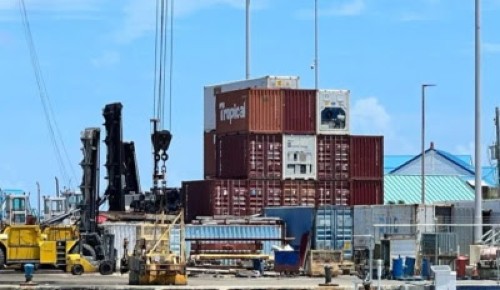GEORGE TOWN, Cayman Islands – The Cayman Islands recorded a more than eight percent cent growth in imports last year over the 2023 figure, according to the Cayman Islands Annual Foreign Trade Statistics Report 2024 released here.
 It said that total merchandise imports had been valued at US$1.65 billion, representing an 8.3 percent increase from the previous year.
It said that total merchandise imports had been valued at US$1.65 billion, representing an 8.3 percent increase from the previous year.
The report noted that the growth was primarily fueled by non-petroleum imports, which climbed nine percent to US$1.43 billion, indicating strong domestic demand across multiple sectors of the economy.
Food and live animal imports showed particularly strong performance, rising 8.5 percent to US$286.3 million. The increase spanned essential categories including meat and meat preparations, fresh vegetables and fruit, cereals, dairy products, and eggs, suggesting both population growth and increased consumer spending power.
The Cayman Islands also recorded significant growth in beverage and tobacco imports, which increased by 9.2 percent to US$62.3 million, driven by higher imports of alcoholic beverages including beer and whisky, as well as non-alcoholic drinks like mineral and sparkling water.
Machinery and transport equipment imports grew 5.5 percent, reflecting continued investment in infrastructure and transportation. The category saw increased purchases of road vehicles, power generating equipment, and electrical machinery.
Manufacturing-related imports also contributed to growth, with manufactured goods classified by materials showing increases due to higher imports of metal manufactures, non-ferrous metals, and cork and wood products.
Not all import categories saw growth. According to the report, crude materials imports, excluding fuels, declined sharply by 20.1 percent due to reduced imports of cork and wood, crude fertilizers, and textile fibers.
Petroleum and petroleum-related imports, while growing 4.6 percent to US$225.1 million, lagged behind the overall growth rate. The increase was attributed to both higher average prices and increased volumes of fuel imported during the year.
Miscellaneous manufactured articles, including clothing, photographic equipment, and furniture, posted modest growth of 4.6 percent.
The broad-based import growth suggests a healthy domestic economy with strong consumer confidence and continued business investment. The significant increase in food imports may reflect both the islands’ growing population and the robust tourism sector that drives much of the local economy.
The strong performance in machinery and transport equipment imports indicates ongoing infrastructure development and business expansion, while the growth in consumer goods suggests healthy household spending.


